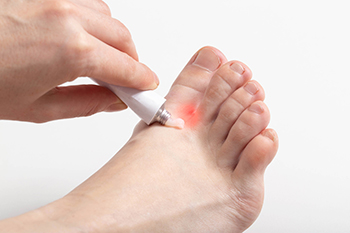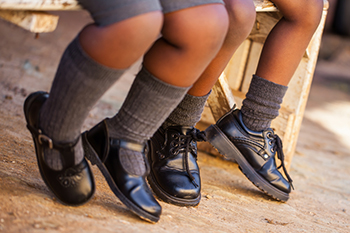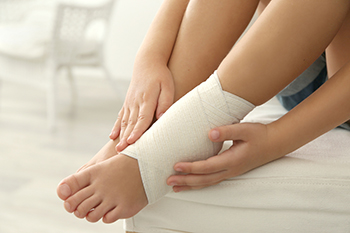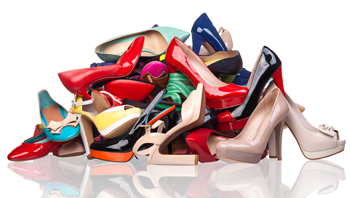Items filtered by date: November 2022
Effective Methods That Can Protect the Feet While Working

People can have foot pain when it is mandatory to stand during the work day. Research has indicated there is an increased number of sick days that are used each year as a result of working on the feet. Some of the foot conditions that develop can include bunions, foot pain, Achilles tendonitis, and poor circulation. These may happen from standing or walking on uneven surfaces, and wearing shoes that do not fit correctly. It is beneficial to elevate the feet as often as the day allows, and performing simple stretches may provide mild relief to the feet. Wearing compression socks or stockings may help to prevent poor circulation, and it can help to wear lower heels. If you would like more information about how to protect your feet while working, please ask a podiatrist who can offer you helpful tips.
While working on the feet, it is important to take the proper care of them. For more information about working on your feet, contact one of our podiatrists from Parkwood Podiatry. Our doctors will treat your foot and ankle needs.
Working on Your Feet
Standing on your feet for long periods of time can cause stress and pain in your feet. Your whole body may experience change in terms of posture, back pain, bunions, callouses and or plantar warts. There are ways to avoid these conditions with proper foot care, smart choices and correct posture.
Positive Changes
Negative heeled shoe – Choosing this shoe type places the heel slightly lower than the ball of the foot. These are great for overall foot health. Find shoes that fit you correctly.
Go barefoot – Our feet were not designed to be enclosed for all hours of the day. Try to periodically expose your feet to air.
Eliminate Pain
Foot Exercises – Performing simple exercises, incorporating yoga and doing stretches are beneficial. This will allow increased blood flow to the area and muscles of the foot.
Achilles tendon – Stretching the foot out flat on the floor will relax the calf muscles and tendon. These exercises can be performed almost anywhere. Make sure you add these exercises to your daily regimen.
With a little bit of this information and knowing more about foot health, you will notice changes. Foot stretches and proper footwear will help with pain and prevent further issues.
If you have any questions please feel free to contact our offices located in Brunswick and Hinesville, GA . We offer the newest diagnostic and treatment technologies for all your foot and ankle needs.
What Are the Symptoms of Athlete’s Foot?

One of the most unsightly and aggravating foot conditions is known as athlete’s foot. In addition to this, it is regarded as being contagious, and it is beneficial to wear appropriate shoes while in certain areas. These environments can include public swimming pools, shower room floors, and locker rooms. Additionally, it is important to refrain from sharing shoes, socks, and towels. It is a fungal infection that invades the skin on the feet through small cuts. Common symptoms that many people experience can include itchiness, redness, and in severe cases, small blisters may develop. It can be uncomfortable between the toes, and many people seek medical attention that can provide relief. Additional symptoms can consist of thicker skin on the bottom of the feet, and the skin may become scaly and perhaps peel. A visit to a podiatrist is often necessary, and this medical professional can properly diagnose and effectively treat athlete's foot.
Athlete’s foot is an inconvenient condition that can be easily reduced with the proper treatment. If you have any concerns about your feet and ankles, contact one of our podiatrists from Parkwood Podiatry. Our doctors will treat your foot and ankle needs.
Athlete’s Foot: The Sole Story
Athlete's foot, also known as tinea pedis, can be an extremely contagious foot infection. It is commonly contracted in public changing areas and bathrooms, dormitory style living quarters, around locker rooms and public swimming pools, or anywhere your feet often come into contact with other people.
Solutions to Combat Athlete’s Foot
- Hydrate your feet by using lotion
- Exfoliate
- Buff off nails
- Use of anti-fungal products
- Examine your feet and visit your doctor if any suspicious blisters or cuts develop
Athlete’s foot can cause many irritating symptoms such as dry and flaking skin, itching, and redness. Some more severe symptoms can include bleeding and cracked skin, intense itching and burning, and even pain when walking. In the worst cases, Athlete’s foot can cause blistering as well. Speak to your podiatrist for a better understanding of the different causes of Athlete’s foot, as well as help in determining which treatment options are best for you.
If you have any questions please feel free to contact our offices located in Brunswick and Hinesville, GA . We offer the newest diagnostic and treatment technologies for all your foot and ankle needs.
Are You Suffering From Ingrown Toenails?
Children and Shoes

A baby’s foot is typically flexible and padded with fat. Most children start to walk between the ages of 8 and 18 months. At this time, they are usually still flat-footed, or their feet turn inward because their bones, muscles, and ligaments have not fully developed. Toddlers should be encouraged to walk barefoot as much as possible as this encourages balance, posture, muscle strength, and coordination. They get important sensory information from the soles of their feet touching the ground. When the child walks confidently, firm-soled shoes can be worn. Footwear can help protect their feet from injury in heat and cold. Have your child’s feet professionally measured to ensure the shoes that are worn are the correct size. Their feet grow quickly so this may need to be done every few months. Shoes that do not fit properly can hamper your child’s walking and cause foot problems like ingrown toenails. Shoes should have plenty of room for their toes, have a flexible, flat sole, and fasteners that do not allow too much movement or slipping of the foot in the shoe. If you have any concerns about your child’s feet or want to learn more about selecting proper shoes, please consult a podiatrist.
Making sure that your children maintain good foot health is very important as they grow. If you have any questions, contact one of our podiatrists of Parkwood Podiatry. Our doctors can provide the care you need to keep you pain-free and on your feet.
Keeping Children's Feet Healthy
Having healthy feet during childhood can help prevent medical problems later in life, namely in the back and legs. As children grow, their feet require different types of care. Here are some things to consider...
Although babies do not walk yet, it is still very important to take care of their feet.
Avoid putting tight shoes or socks on his or her feet.
Allow the baby to stretch and kick his or her feet to feel comfortable.
As a toddler, kids are now on the move and begin to develop differently. At this age, toddlers are getting a feel for walking, so don’t be alarmed if your toddler is unsteady or ‘walks funny’.
As your child gets older, it is important to teach them how to take care of their feet.
Show them proper hygiene to prevent infections such as fungus.
Be watchful for any pain or injury.
Have all injuries checked by a doctor as soon as possible.
Comfortable, protective shoes should always be worn, especially at play.
If you have any questions please feel free to contact our offices located in Brunswick and Hinesville, GA . We offer the newest diagnostic and treatment technologies for all your foot and ankle needs.
What Is a High Ankle Sprain?

An ankle sprain is one of the most common sports injury nationwide. A lower ankle sprain is experienced by most people who endure this type of injury, and this is defined as damage that is done to the tendons and muscles below the ankle. Conversely, a high ankle sprain affects the ligaments that support the leg bones which connect to the ankle. This can happen as a result of the foot twisting outward and stretching beyond its normal range of motion. The common symptoms that can accompany a high ankle sprain can include pain while walking upstairs, as the foot flexes upward. The ankle may also feel weak, and this can make walking difficult. Performing a squeeze test is often successful in determining an existing high ankle sprain. This is done by squeezing the patient’s leg under the knee, and observing if there is pain that radiates to the ankle area. Relief can be found when the affected foot is elevated, and existing swelling may be reduced when the foot is wrapped in compression bandages. If you have this type of injury, it is strongly advised that you consult with a podiatrist who can effectively treat an ankle sprain.
Although ankle sprains are common, they aren’t always minor injuries. If you need your ankle injury looked at, contact one of our podiatrists from Parkwood Podiatry. Our doctors can provide the care you need to keep you pain-free and on your feet.
How Does an Ankle Sprain Occur?
Ankle sprains are the result of a tear in the ligaments within the ankle. These injuries may happen when you make a rapid shifting movement while your foot is planted. A less common way to sprain your ankle is when your ankle rolls inward while your foot turns outward.
What Are the Symptoms?
- Pain at the sight of the tear
- Bruising/Swelling
- Ankle area is tender to touch
- In severe cases, may hear/feel something tear
- Skin discoloration
Preventing a Sprain
- Wearing appropriate shoes for the occasion
- Stretching before exercises and sports
- Knowing your limits
Treatment of a Sprain
In many cases, the RICE method (Rest, Ice, Compression, and Elevate) is used to treat ankle sprains. However, you should see a podiatrist to see which treatment option would work best with your injury. In severe cases, surgery may be required.
It is important to ask your doctor about rehab options after you receive treatment for your injury. Stretching, strength training, and balance exercises may help the ankle heal while also preventing further injury.
If you have any questions, please feel free to contact our offices located in Brunswick and Hinesville, GA . We offer the newest diagnostic and treatment technologies for all your foot care needs.
Are People Still Wearing High Heels?

High Heel sales dropped 71% in 2020, according to fashion trends, and it is unclear whether they will ever increase or whether we even want to wear them as much anymore. The pandemic and associated shutdowns curtailed fancy dressing and going out. Many women relied on athletic shoes and flats during this time. It is uncertain of what will happen in the future, but we know that more people are working from home now and high heel sales started to decline before the pandemic. Business casual took on new meaning with younger professionals who wore trendy high-tops, clogs, and Uggs to work. Streetwear became high fashion, and there were shifts in what was appropriate attire for an office. Comfort is in. People are also at their best when they look it and feel it. Frequently wearing high heels can cause foot issues and younger people are less willing to feel foot pain. It is beneficial that fashion is changing and wearing them only for special occasions may be on the rise. If you want to learn more about how to properly care for your feet to get you through a lifetime of changing footwear trends, please consult with a podiatrist.
High heels have a history of causing foot and ankle problems. If you have any concerns about your feet or ankles, contact one of our podiatrists from Parkwood Podiatry. Our doctors can provide the care you need to keep you pain-free and on your feet.
Effects of High Heels on the Feet
High heels are popular shoes among women because of their many styles and societal appeal. Despite this, high heels can still cause many health problems if worn too frequently.
Which Parts of My Body Will Be Affected by High Heels?
- Ankle Joints
- Achilles Tendon – May shorten and stiffen with prolonged wear
- Balls of the Feet
- Knees – Heels cause the knees to bend constantly, creating stress on them
- Back – They decrease the spine’s ability to absorb shock, which may lead to back pain. The vertebrae of the lower back may compress.
What Kinds of Foot Problems Can Develop from Wearing High Heels?
- Corns
- Calluses
- Hammertoe
- Bunions
- Morton’s Neuroma
- Plantar Fasciitis
How Can I Still Wear High Heels and Maintain Foot Health?
If you want to wear high heeled shoes, make sure that you are not wearing them every day, as this will help prevent long term physical problems. Try wearing thicker heels as opposed to stilettos to distribute weight more evenly across the feet. Always make sure you are wearing the proper shoes for the right occasion, such as sneakers for exercising. If you walk to work, try carrying your heels with you and changing into them once you arrive at work. Adding inserts to your heels can help cushion your feet and absorb shock. Full foot inserts or metatarsal pads are available.
If you have any questions please feel free to contact our offices located in Brunswick and Hinesville, GA . We offer the newest diagnostic and treatment technologies for all your foot and ankle needs.

